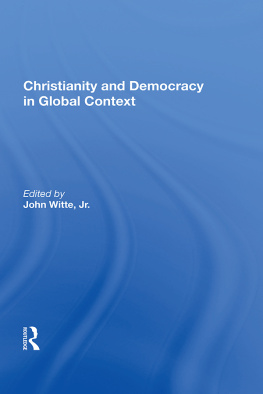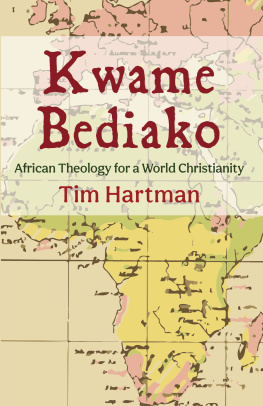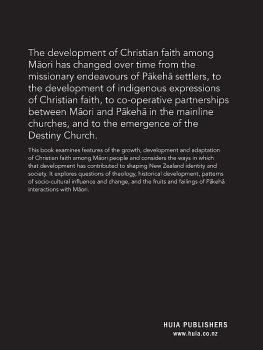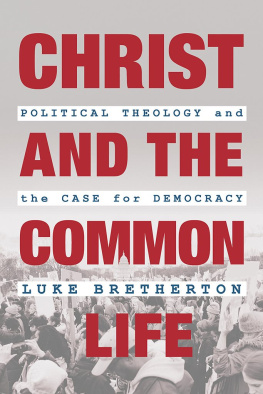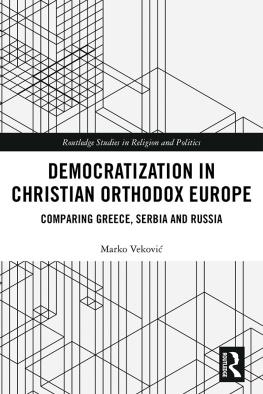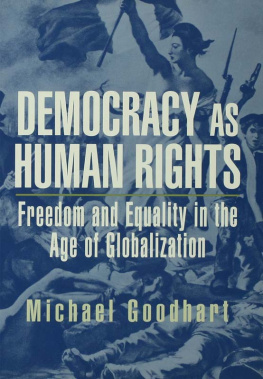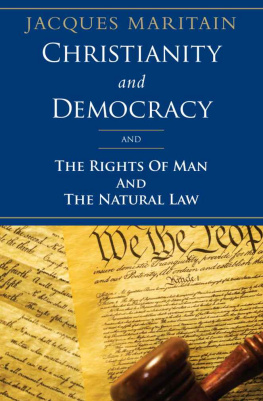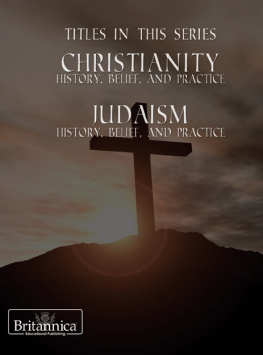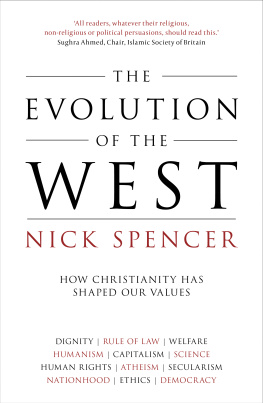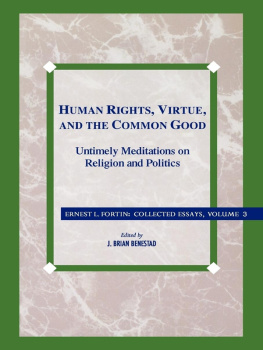First published 1993 by Westview Press
Published 2018 by Routledge
52 Vanderbilt Avenue, New York, NY 10017
2 Park Square, Milton Park, Abingdon, Oxon OX14 4RN
Routledge is an imprint of the Taylor & Francis Group, an informa business
Copyright 1993 by the Law and Religion Program at Emory University.
All rights reserved. No part of this book may be reprinted or reproduced or utilised in any form or by any electronic, mechanical, or other means, now known or hereafter invented, including photocopying and recording, or in any information storage or retrieval system, without permission in writing fromthe publishers.
Notice:
Product or corporate names may be trademarks or registered trademarks, and are used only for identification and explanation without intent to infringe.
A CIP catalog record for this book is available from the Library of Congress.
ISBN 0-8133-1843-2
ISBN 13: 978-0-367-00782-9 (hbk)
Contents
JIMMY CARTER, The Carter Center of Emory University
JOHN WITTE, JR., Emory University
J. BRYAN HEHIR, Georgetown University
WOLFGANG HUBER, Ruprecht-Karls-Universitt, Heidelberg
ROBERTO PAPINI, Instituto International Jacques Maritain, Rome
JEAN BETHKE ELSHTAIN, Vanderbilt University
JAMES W. SKILLEN, Center for Public Justice
RICHARD JOHN NEUHAUS, Institute on Religion and Public Life
REBECCA S. CHOPP, Emory University
JON P. GUNNEMANN, Emory University
LUIS E. LUGO, Calvin College
MARCOS MCGRATH, C.S.C. Catholic Archbishop of Panama
PAUL E. SIGMUND, Princeton University
KWAME BEDIAKO, Akrofi-Chiistaller Memorial Centre, Ghana
RICHARD JOSEPH, Emory University
CHARLES VILLA-VICENCIO, University of Cape Town
JOHN S. POBEE, World Council of Churches, Geneva
HAROLD J. BERMAN, Emory University
M. THOMAS THANGARAJ, Emory University
DESMOND M. TUTU, Anglican Archbishop of Cape Town
Guide
A number of colleagues have contributed generously to the completion of this volume. I would like to thank Ms. Marie Warren for her swift typing and retyping of the manuscript, Ms. M. Christian Green and Dr. Bruce P. Frohnen for their able and ample research assistance, and Ms. Eliza Ellison for her careful editing and copyediting.
This volume is one product of an ongoing project on Christianity and democracy undertaken by the Law and Religion Program at Emory University. I owe an enormous debt of gratitude to Howard O. Hunter, Dean of the Emory Law School, and James T. Laney, President of Emory University, for their enthusiastic support of this project, as well as to the members of the Emory University Committee on Law and Religion for their invaluable collaboration on it. On behalf of the Law and Religion Program, I wish to thank The Pew Charitable Trusts, and their program directors, Dr. Joel Carpenter and Dr. Kevin Quigley, for their gracious and unstinting support of our efforts.
John Witte, Jr.
JIMMY CARTER
The Carter Center of Emory University, Atlanta, Georgia
I am pleased to be able to provide a brief foreword to this volume on Christianity and democracy. I do not profess to be a theologian and am not going to try to go into any depths about the theory of the relationship between Christianity and democracy. I simply shall offer you a few personal thoughts based on my own knowledge and experience.
I decided to look up in the Websters Dictionary , just for abbreviations sake, the definitions of the words Christian and democracy. Christian is defined as a person professing Jesus as Christ, or having the qualities demonstrated by Jesus Christ, such as love, humility, compassion, and peace. Democracy is defined as government through which people hold the ruling power directly or indirectly through chosen representatives. I think that frames the essence of what I wish to discuss and what is discussed in this volumethe interrelationship between faith in Christ, a commitment to the principles on which Christ based his life, teachings, and actions, and governments based upon the power or will of the people.
I grew up in Plains, Georgia, where there was an almost total commitment in our Baptist church to separation of church and state. I grew up in a democratic church. We chose and still choose our own pastors. We have secret ballots for deacons. We attend the Southern Baptist Convention, though not with delegates. We are very careful to establish that they are only messengers; they cannot speak for the rest of the church, unless authorized to do so. They come back from the Southern Baptist Convention and make their report to our church. Particularly in the last few years, one of the most joyful occasions in the Maranatha Baptist Church, where I attend, is to reject almost totally everything that the Southern Baptist Convention has decided. So you can see that I have a deeply embedded interest in democracy and Christianity and in the separation of church and state.
I had an awakening when I got into presidential politics. One night in North Carolina during the 1976 campaign, just in an off-hand way, with a few people present in a family living room, somebody asked me if I was a born-again Christian, and I said yes. That caused a kind of sweeping concern among political commentatorsthat I would get weird signals from heaven and so forth. But 1 went into the White House, and I was doing pretty well until the newly elected president of the Southern Baptist Convention came to visit me in the Oval Office, to shake hands and have a photograph made. I shall always remember when he left the Oval Office, after I had been working on Panama Canal Treaties, establishing a Department of Education, and negotiating on an equal basis with the Soviets to get SALT II approved. He looked at me, his wife standing by, and said, We are praying, Mr. President, that you will abandon secular humanism as your religion. This was a shock to me. I didnt really know what it meant. But the same president of the Southern Baptist Convention was the one who later said that the prayers of a Jew are not heard by God.
I say this in part to attract your attention to a point: The interpretation of Christianity is not as simple as Webster defines it in a small dictionary. It is not as simple as we interpret it in our minds and hearts. Our nation is one founded on a belief in God, although we do not specify how that belief should be described or expressed. Yet some people believe that they can define what is an acceptable American citizen, based on compatibility with their own form of religious faith.
Our country has not always exhibited a commitment to the things that we look upon as Christian beliefs. We have been too much inclined perhaps in past years to abide by the status quo. If somebody would claim to be an anti-communist, we would basically support him. Think of the authoritarian dictatorsAnastasio Somoza, Ferdinand Marcos, Park Chung Hee, Augusto Pinochet, and many others. We aligned ourselves with them because we had a stronger aversion to atheistic communism than to their abuses of human rights. That attitude has shaped a great portion of our nations foreign policy in past years.
Now we can take a new look to the future. I think we can have a much freer concept of what our nation can do as a nation, and what we can do as Christians to shape the policies of our country. The Cold War is over. There is no more Soviet Union. We do not face the intense competition in every small country on earth for hegemony or influencepolitically, economically, or militarily. So, in effect, we have a blank slate on which to write our future. This gives us the freedom and ability to assert our opinions and to shape the policies of our government in a much more enlightened way, if we make that choice. I think we have approached a point where we can prove whether it is possible to exhibit simultaneously the Christian characteristics of compassion, of sharing, and of peace with the democratic principles of freedom, equality, human rights, and the right of the people to rule.

